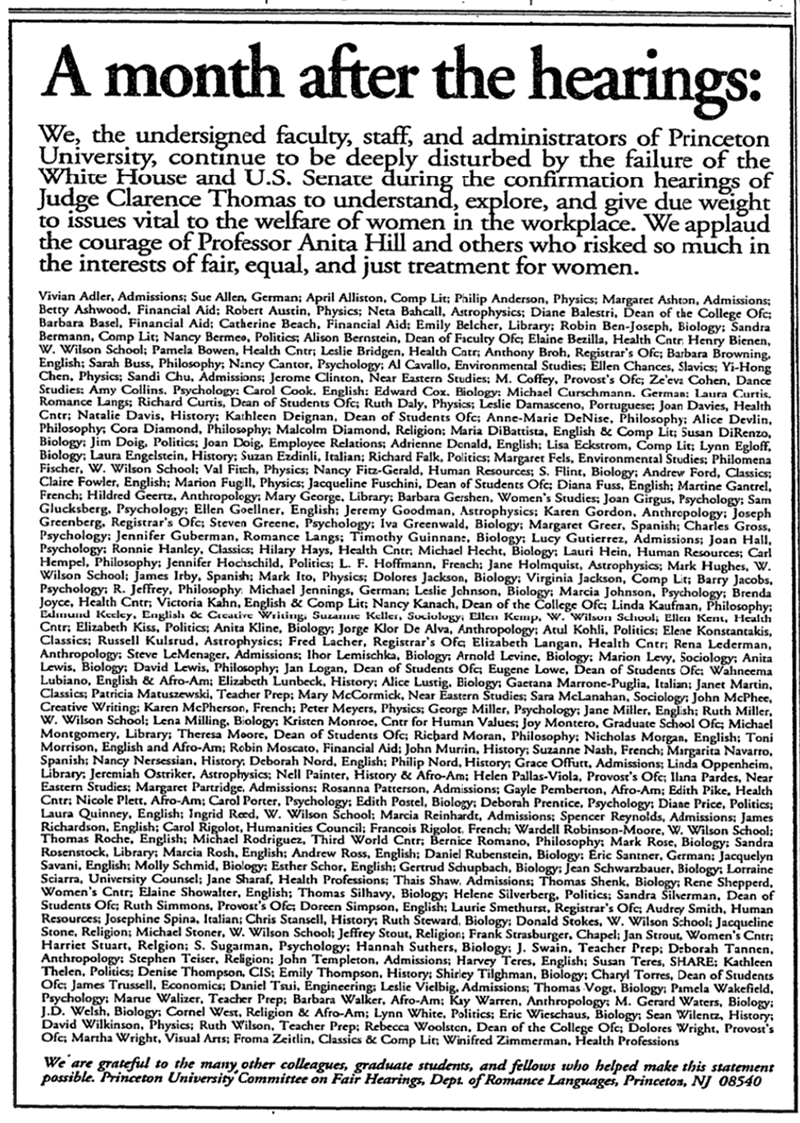Expressing Solidarity in a Quarter-Page Ad
In 1991, Princeton faculty, staff, and administrators stood with Anita Hill, advocating for women in the workplace
For many Americans, Christine Blasey Ford’s upcoming appearance before the Senate Judiciary Committee brings back sharp recollections of Anita Hill’s 1991 testimony before the same committee, against then-Supreme Court nominee Clarence Thomas.
Then, angered by the committee’s treatment of Hill, some Princeton professors and staff felt compelled to make their feelings known, purchasing a quarter-page ad in The New York Times.
“When Anita Hill was grilled like that in such condescending and insulting ways, we were just appalled,” said professor emerita Suzanne Nash *72, who wrote and circulated the ad with then-politics professor Helene Silverberg. “We were young and determined to do something."
The ad ran in the Times Nov. 22 — six weeks after Hill’s Oct. 11 testimony. It read: “We the undersigned faculty, staff, and administrators of Princeton University were deeply disturbed by the failure of the White House and the Senate during the confirmation hearings of Judge Clarence Thomas to understand, explore, and give due weight to issues raised in the testimony vital to the welfare of women in the workplace. We applaud the courage of Professor Anita Hill and others who with great dignity risked so much to advance the cause of justice and fair and equal treatment for women.”
Nash and Silverberg wrote the ad copy shortly after Hill’s testimony at the hearings and asked faculty and staff to sign on during the next two weeks. Before the days of social media or email blasts, the two professors built support through personal conversations.
About 300 people contributed money for the $12,033 ad and signed it — many more than whose names could fit within the quarter-page space. Nash said she was pleased by the diversity of the signers, who included administrative staff and faculty. Among the signers were some of Princeton’s best-known professors, including John McPhee ’53, Toni Morrison, Shirley Tilghman, and Cornel West *80.
“We were definitely very political, even though we were careful not to say anything showing that we opposed Clarence Thomas,” Nash said Friday. “What the ad says is that we believe Anita Hill. It was about her and about women in the workplace, about listening fairly to people testifying.”
Nash said she received dozens of letters from the public after the ad ran. Some celebrated the message, while others defended the fairness of the hearing or attacked the feminists who wrote the ad.
“It was a moment of pride and solidarity,” said signer Maria DiBattista, professor of English and comparative literature. “Helene and Suzanne were very careful in crafting the actual text to make it as broad in its implications as possible, and to bring in as many people of varying political persuasions in support of Anita Hill.”
DiBattista said she thinks the signatories from nearly three decades ago would be as interested in Ford’s potential hearing today. “The sentiments remain the same if not even more intense today,” she said. “Perhaps a little disheartened that we’re in an age where these events can still happen, but I think there’s a sense of progress at the same time.”












No responses yet